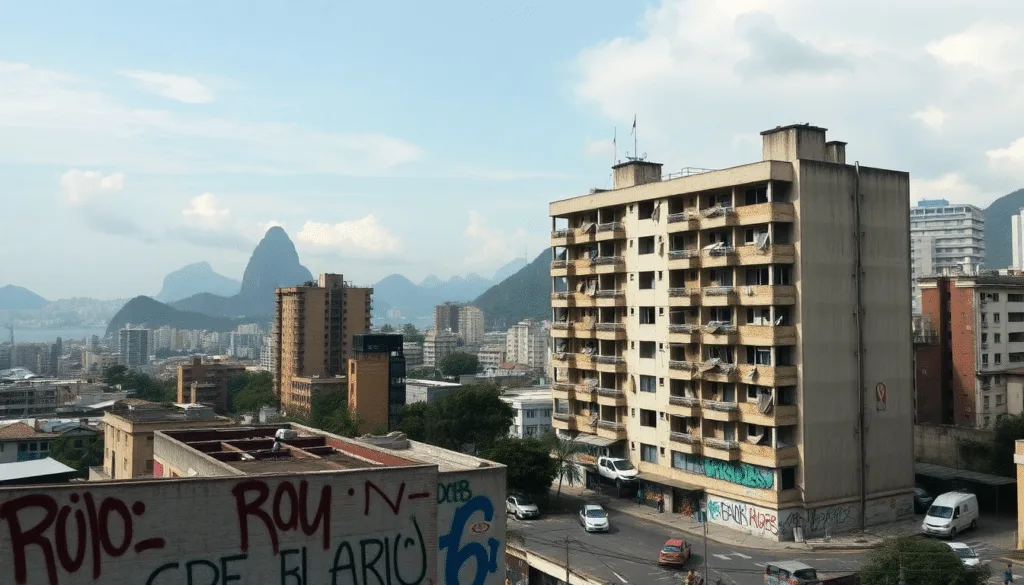Rio de Janeiro has long been a city marked by a complex interplay of beauty and violence. The historical context of urban violence in Rio can be traced back to socio-economic disparities, which have produced marginalized communities that often coincide with high-crime areas. The informal economy plays a significant role in this, as it fuels various types of crime, including drug trafficking, robbery, and gang-related violence. During the holiday season, the city sees a dramatic spike in these activities. The holiday period attracts not only tourists but also individuals seeking to capitalize on the increased foot traffic.
Statistical evidence indicates an uptick in reported crimes during this time. Instances of theft and burglary, in particular, become more prevalent, as both residents and visitors tend to let their guard down amidst the festive atmosphere. Tourists, often carrying valuables while exploring the city’s attractions, become prime targets for pickpockets and thieves. The holiday season creates an inviting backdrop for those intent on exploiting vulnerabilities within the masses.
Moreover, the social dynamics in Rio de Janeiro complicate matters. There is often a noticeable dichotomy between affluent areas and their impoverished counterparts. Illustratively, neighborhoods in close proximity often coexist with stark contrasts in living conditions. This reality can lead to tensions, particularly during holidays when wealth disparities become more pronounced. Awareness of this societal landscape is essential for individuals aiming to navigate Rio with care.
Understanding the nature of violence in Rio de Janeiro, especially during the holiday season, is crucial for both locals and visitors. By recognizing the patterns and potential risks, one can develop informed strategies to stay safe while experiencing the vibrant culture this iconic city has to offer.
Understanding the Risks: Common Types of Violence
Rio de Janeiro, known for its vibrant culture and beautiful landscapes, unfortunately, has its share of risks associated with violence, particularly during the holiday season when tourism peaks. Understanding the common types of violence that occur in the city can significantly enhance one’s safety and overall experience. One prevalent form of violence is robbery, which often manifests as street thefts where assailants target tourists, especially in crowded areas. These incidents can occur swiftly, sometimes involving a group working in tandem to distract the victim while another steals belongings.
Additionally, assault is another serious concern. Unprovoked attacks can happen in various contexts, including late-night outings or in less populated areas. Tourists may inadvertently wander into neighborhoods that are known for higher crime rates, thereby increasing their vulnerability. It is essential for visitors to research and be aware of these high-risk neighborhoods, which tend to have higher rates of violent crime, especially during events when crowds gather and security is less stringent.
Domestic violence is also a notable issue in Rio de Janeiro, often exacerbated during holiday periods when tensions may rise within households. While tourists may not directly encounter domestic violence, the broader implications of such violence in communities can affect overall safety and the atmosphere during one’s stay. Understanding the dynamics and recognizing the signs of potential violence in one’s surroundings can be crucial for staying safe.
Awareness of these types of violence, the methods employed, and the specific high-risk areas can better equip tourists to navigate Rio de Janeiro with vigilance. Practicing caution and being informed about the patterns of violence prevalent in the city can go a long way in ensuring a secure holiday experience.
Safety Tips for Tourists: Do’s and Don’ts
When visiting Rio de Janeiro, one of the most vibrant and picturesque cities in the world, it is crucial to prioritize your safety. To ensure a pleasant experience, here are some essential do’s and don’ts tailored specifically for tourists.
Firstly, do keep your personal belongings secure and close to you at all times. Utilize anti-theft bags or money belts, especially in crowded areas such as Copacabana Beach or the bustling markets. This minimizes the risk of pickpocketing, which can frequently occur in locations frequented by tourists. Additionally, do remain vigilant about your surroundings. Being observant can significantly reduce the likelihood of becoming a target for theft or scams. Trust your instincts—if a situation feels uncomfortable, it is advisable to leave.
Another practice to adopt is avoiding risky neighborhoods, especially after dark. While some areas of Rio are safe and appealing for tourists, others are known for high crime rates. Researching your destinations beforehand, or seeking the advice of locals and trusted resources, can be invaluable in navigating the city safely. Ensure that you use reputable transportation options as well, opting for registered taxis or ride-sharing services rather than accepting offers from unlicensed drivers.
On the other hand, there are certain behaviors to avoid during your stay. Don’t display flashy jewelry or carry large amounts of cash. This can attract unwanted attention and compromise your safety. Moreover, refrain from engaging with overly aggressive street vendors or performers, as this can escalate into uncomfortable situations. Lastly, avoid walking alone late at night in unfamiliar areas, as this increases vulnerability.
By adhering to these straightforward do’s and don’ts, you will enhance your overall safety and enjoyment while exploring the captivating beauty of Rio de Janeiro during the holiday season.
Emergency Contacts and Local Resources
When traveling to Rio de Janeiro, especially during the holiday season, it is crucial to be aware of local emergency contacts and resources. Familiarizing yourself with these contacts can significantly enhance your safety and provide peace of mind. For immediate police assistance, travelers should dial 190, which connects you with the local police force that is available 24/7. This service is essential for reporting incidents such as theft or any suspicious activities. In situations requiring medical attention, the emergency telephone number for hospitals is 192, which directs callers to the medical services available throughout the city. It is advisable to note down the addresses and contact numbers of nearby hospitals before your visit.
Additionally, for tourists needing assistance specifically catered to their needs, the Tourist Police, known as “Policia Turística,” can be reached at 2332-9692. They offer guidance and support to international visitors who may experience various types of issues, including theft or harassment. This department is dedicated to ensuring that tourists feel secure and supported during their stay.
Beyond immediate emergency contacts, it is wise to be aware of community resources that can aid victims of violence. Several non-governmental organizations (NGOs) work vigilantly in Rio de Janeiro to provide support, counseling, and shelter for those in distressing situations. Organizations such as CEJIL (Centro de Estudios Legales y Sociales) and the SOS Violence hotline at 180 are dedicated to assisting individuals facing violence and can offer crucial help. Equipping yourself with knowledge about these vital resources will help create a safer travel experience, allowing you to enjoy your holiday in Rio while being prepared for any unforeseen circumstances.
Travel Insurance: Why It Matters
When traveling to destinations such as Rio de Janeiro, securing travel insurance is paramount. The unpredictable nature of travel, particularly in a vibrant yet bustling city, necessitates the need for comprehensive coverage to safeguard against unforeseen circumstances. Travel insurance typically encompasses several critical aspects including coverage for theft, medical emergencies, trip cancellations, and lost luggage, which are invaluable facets of a well-rounded travel experience.
In a city known for its rich culture and picturesque landscapes, tourists might inadvertently expose themselves to risks ranging from petty theft to more severe medical emergencies. Therefore, choosing a travel insurance policy that provides adequate coverage becomes crucial. When evaluating policies, it is essential to ensure that they offer robust protection against theft. Consider policies that cover personal belongings, such as electronics and important documents, which may be at risk in crowded tourist areas.
Moreover, medical emergencies can happen anytime, and having a policy with comprehensive medical coverage allows travelers peace of mind. Investigate whether the policy covers hospital and emergency medical expenses, repatriation, and any necessary medical evacuations. Understanding the terms of your policy is vital, including limitations and exclusions that may apply.
In addition to understanding what to look for in a travel insurance policy, knowing how to file a claim can be a deciding factor in stressful situations. Most insurance providers offer dedicated customer service for claims processing. Keeping copies of important receipts and documentation can expedite this process. Equip yourself with emergency contact numbers and understand the steps required to report an incident, as this knowledge will facilitate a smoother navigation of any unfortunate circumstances.
Best Practices for Local Transportation Safety
Rio de Janeiro, renowned for its vibrant culture and stunning landscapes, also presents unique challenges regarding transportation safety, particularly for visitors. To ensure a secure experience, understanding the city’s public transportation options and adhering to best practices is crucial. Public buses and metro systems are widely used yet may expose travelers to risks. Opting for reputable transport choices is the first step in enhancing safety.
When considering public transportation, it is advisable to use well-marked bus stops and travel during peak hours when there are more people around. Always keep an eye on personal belongings and be aware of your surroundings to avoid becoming a target for petty theft. The metro system tends to be safer and more reliable; thus, utilizing it for reaching key destinations can be a wise choice. Additionally, try to familiarize yourself with the metro map and plan your routes in advance, which will help reduce anxiety while navigating the city.
For travelers choosing taxi services, it is prudent to select established companies or use ride-hailing apps such as Uber, 99, or Cabify, which have become popular in Rio. These platforms provide an added layer of security as they allow users to track their rides and share details with friends or family. When using taxis, avoid roadside taxis and be on the lookout for official taxi markings to ensure you’re not getting into an unlicensed vehicle.
It is also crucial to stay vigilant against potential scams. Be cautious when approached by individuals offering unsolicited assistance with transportation or directions, as they could be attempting to distract you while an accomplice targets your belongings. By following these best practices, you can significantly reduce risks and enhance your overall experience in Rio de Janeiro.
Cultural Awareness: Engaging Respectfully with Locals
Understanding and respecting the cultural nuances of Rio de Janeiro is crucial for anyone visiting this vibrant city, especially during the holiday season. Engaging respectfully with locals not only enhances the travel experience but also plays a significant role in ensuring personal safety. To navigate the social landscape of Rio effectively, one must be aware of certain cultural sensitivities that are unique to the area.
First and foremost, greetings in Brazil are characterized by warmth and familiarity. A simple handshake, a friendly smile, or a light kiss on the cheek can significantly foster goodwill among locals. Being open and engaging in dialogue is appreciated, but it is important to be aware of personal space and follow cues from the local conversation style. Showing genuine interest in the Brazilian culture can help build rapport and defuse any potential misunderstandings.
Additionally, it’s essential to recognize that Brazilian society is diverse, comprising various ethnicities and traditions. While many locals may embrace a lively atmosphere, others might prefer a more reserved approach. Hence, being attuned to the emotional context behind interactions can prevent social faux pas. For instance, avoid discussing sensitive topics such as politics or socioeconomic issues unless the local initiates the conversation.
Moreover, when it comes to safety, understanding societal norms can help mitigate risks. Certain areas may have different codes of conduct or social hierarchies that dictate behavior. Being respectful of these norms can deter unwanted attention and promote a safer environment. Learning a few basic Portuguese phrases, such as “por favor” (please) and “obrigado” (thank you), can also go a long way in expressing respect and appreciation, enhancing your interactions and overall experience in Rio de Janeiro.
Avoiding Alcohol-Related Incidents
Alcohol consumption is a prevalent aspect of social gatherings, especially during holiday festivities in Rio de Janeiro. However, it is imperative to recognize the potential risks associated with excessive drinking, which can lead to incidents of violence and unsafe situations. Understanding how to navigate these challenges is crucial for ensuring a safe and enjoyable experience.
One fundamental approach to avoiding alcohol-related incidents is through diligent monitoring of one’s drinking habits. Establishing a limit before commencing social activities can help individuals maintain control over their alcohol consumption. Keeping track of the number of drinks consumed and pacing oneself can significantly reduce the likelihood of overindulgence. Many find it helpful to alternate alcoholic beverages with non-alcoholic options, such as water or soda. This practice not only helps manage intoxication levels but also keeps hydration in check, thereby enhancing overall well-being during festive gatherings.
Recognizing the signs of overindulgence is equally important. Symptoms such as slurred speech, impaired coordination, and an altered state of judgment can indicate that it is time to stop drinking. Being aware of how alcohol affects personal behavior is vital for preventing situations that could escalate into violence or unsafe encounters. It is advisable to maintain open communication with friends regarding drinking limits and to look out for one another. Establishing a buddy system ensures that individuals can maintain a sense of security within social settings.
Moreover, choosing to socialize in familiar and safe environments is key. Selecting venues that are well-reviewed and frequented by locals can enhance safety during nights out. Engaging in social activities with known acquaintances rather than unfamiliar groups also reduces the risks associated with alcohol consumption. By adhering to these guidelines, individuals can enjoy the festive season while significantly minimizing the chances of alcohol-related incidents.
Staying Vigilant and Empowered
As the holiday season approaches, the allure of Rio de Janeiro captivates many travelers seeking to indulge in its vibrant culture, breathtaking landscapes, and festive atmosphere. However, it is imperative to recognize the undercurrents of risk that accompany any travel experience, particularly in bustling cities like Rio. The key to enjoying a safe and memorable holiday lies in the awareness and proactive measures taken by individuals.
Throughout this guide, we have highlighted several essential strategies to enhance your personal safety and well-being while exploring this dynamic city. Establishing a solid understanding of local customs, areas of concern, and transportation options can greatly reduce the likelihood of encountering unsafe situations. Additionally, empowering oneself with knowledge about emergency contacts and local law enforcement can provide peace of mind during your stay.
Moreover, being vigilant while navigating crowded tourist spots, markets, and nightlife venues is paramount. Small acts, such as maintaining situational awareness and safeguarding personal belongings, can make a substantial difference in ensuring a stress-free holiday experience. Equally, building a network of trusted locals or fellow travelers can lend support and insight that enhances comfort and security.
Ultimately, while Rio de Janeiro does present its challenges, it is also a city filled with warmth, beauty, and exhilarating experiences waiting to be discovered. By embracing the recommendations provided throughout this blog post, travelers can foster a sense of empowerment that allows them to fully immerse themselves in their holiday plans. With determination and vigilance, a safe, engaging, and enriching experience in Rio is well within reach.





